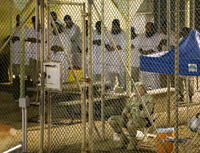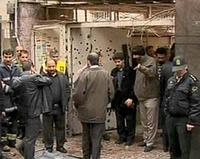-
Wikileaks: North Korea "helps Burma with nuclear sites"
U.S. diplomatic cables released by WikiLeaks reveal that Burma may be building missile and nuclear sites in remote locations with support from North Korea; the documents cite witnesses who say North Korean workers are helping Burma construct an underground bunker in a remote jungle; one cable reads: ‘The North Koreans, aided by Burmese workers, are constructing a concrete-reinforced underground facility that is ‘500 ft from the top of the cave to the top of the hill above’”
-
-
King: House Homeland Security panel will be vigorous, demanding
Long Island congressman Peter King will take over as the new chair of the House Homeland Security Committee — New York state’s lone chairman in the new Congress (and even this only until 2012, when he will be term-limited out of the chairman’s chair, unless he gets a waiver from the Republican leadership); he has been a vocal critic of the Obama administration on a number of issues over the last two years, and says he plans for a much more vigorous — and possibly controversial — committee when he re-takes the gavel; King expressed concern about Obama administration officials’ response to what he calls the “incalculable damage” caused by the massive document leak released by WikiLeaks; “Considering how fast they moved [to file a laswsuit] on Arizona’s immigration law and how determined they were to move against our CIA agents—- there is definitely something missing here,” he asserted
-
-
Gitmo repeat offender rate rises sharply

The number of Guantanamo Bay detainees returning to the battlefield continues to grow at an extraordinary rate; new report from the director of U.S. national intelligence says that 150 of the 598 detainees who have been transferred out of Guantanamo’s detention camps, about 25 percent, are now confirmed or suspected of returning to the battlefield; of that group, 13 are dead and 54 are again in custody, while 83 remain at large; CIA director Leon Panetta said the biggest concern is ex-detainees who not only return to the battlefield but take up leadership positions within al Qaeda, a reference to the terror group’s branch in Yemen, where at least two leaders are Saudis and former Guantanamo detainees
-
-
Medical isotopes no longer require weapons-grade uranium
Highly enriched uranium (HEU) is used in nuclear weapons, but it is also used to make the radioisotopes that are injected in tiny quantities into people to diagnose and treat disease; indeed, making medical isotopes is a time-honored excuse for enriching uranium, if you want to build nuclear weapons but do not want to admit you are doing so (this is the cover Iran is using for its bomb-oriented enrichment program); South Africa’s Pelindaba reactor is now producing medical treatment-oriented molybdenum-99 (Mo-99) made from low-enriched uranium
-
-
Judge throws out suit aiming the bar U.S. from killing al-Awlaki

Anwar al Awlaki, the New Mexico-born fire-brand Islamic cleric, from his hideout in Yemen, has been urging Muslims to kill Americans; the Obama administration has placed him on its capture-or-kill hit list, and U.S. special forces and intelligence operatives have been searching for him; the cleric’s father, Nasser al Awlaki of Yemen, sued the U.S. government, arguing that international law and the Constitution prevented the administration from unilaterally targeting his son for death unless he presents a specific imminent threat to life or physical safety and there are no other means to stop him; the suit also tried to force the government to disclose standards for determining whether U.S. citizens like his son can be targeted for death; a federal judge has thrown out the law suit, writing in his opinion: “The serious issues regarding the merits of the alleged authorization of the targeted killing of a U.S. citizen overseas must await another day or another nonjudicial forum”
-
-
Microsoft partner in China trains hackers, steals 50 MB of U.S. gov't e-mail
A Chinese security firm called Topsec got access to the Windows source under a 2003 agreement designed to help companies improve the security of the Microsoft operating system; the company, rather than help Microsoft make Windows more secure, worked closely with Chinese intelligence to exploit Windows weaknesses: they helped the Chinese government train hackers — and steal more than 50 MB of secret U.S. government e-mails; Topsec started out in 1995 with funding of just $4,400, and by 2002 had earnings about $440 million; it is now China’s largest provider of information security products and services
-
-
Al Qaeda seeks to surgically implant bombs into "martyrs'" bodies
Al Qaeda operatives are looking for ways to defeat the growing number of full-body scanners at airports around the world; they recently tried to deploy a pair of kamikaze canines on a U.S.-bound airplane from Baghdad airport; the bombs were placed inside the dogs’ bodies, but the plot failed because the bombs were so poorly stitched inside the dogs, that the dogs died; Web sites affiliated with al Qaeda are now calling of doctors and scientists sympathetic to the organization to help it devise ways for surgically stitching bombs inside human beings, to usher in what one of the organization’s operatives calls a “new kind of terrorism”
-
-
Portland reconsiders relations with FBI's terrorism task force
Five years ago the mayor of Portland, Oregon, decided not to participate in the FBI’s Joint Terrorism Task Force because of concerns about civil liberties; the past weekend’s capture of a 19-year old after he attempted to detonate what he thought was a vehicle bomb near a tree-lighting ceremony in Portland’s Pioneer Courthouse has led the mayor to reconsider his decision
-
-
Exploding garbage truck in Florida not act of terrorism
An explosion on an Orlando, Florida garbage truck raise fears that the garbage-truck crew had stumbled on an underground bomb factory which had foolishly thrown some of its products in the rubbish — or that the explosion presaged a fearful terror wave campaign of exploding bins or municipal vehicles; police investigation finds that the explosion was caused by a local resident foolishly disposing of a pressurized container in their garbage
-
-
Israeli agents kill yet another senior Iranian nuclear scientist

Israel’s covert campaign to derail Iran’s nuclear weapons program continues unabated; the latest chapter: a senior Iranian nuclear weapons scientists, Majid Shahriari, was killed, and a fellow scientists seriously injured, when two groups of operatives on motorcycles approached their cars on busy Teheran streets and opened fire from automatic weapons; the covert campaign has already claimed more than a dozen leading nuclear scientists and engineers (five of whom killed in Teheran, the others while traveling in Europe), as well as several Revolutionary Guard senior officers associated with the nuclear weapons program; in addition, nuclear weapons-related warehouses and depots, located in Revolutionary Guard military bases, were blown up, and disguised nuclear technology shipments to Iran were seized in ports in Europe, America, and Asia; on 16 November, Iran temporarily shut down its uranium enrichment facilities after the Stuxnet virus, designed by the secretive Unit 8200 of Israel’s Military Intelligence, destroyed hundreds of centrifuges
-
-
"Whoever needs to know, knows": Israel intensifies covert campaign against Iran
Israel believes that the best guarantee of its security is the ability to maintain its regional nuclear monopoly; to that end, it used covert means to stop the nuclear weapons programs of Egypt (1960-63) and Iraq (1970s-1980s); it also used less covert means, such as attacking and destroying nuclear reactors in Iraq (1981) and Syria (2007); if the past is an indication, Israel will see to it that Iran, too, will find its effort to acquire the bomb to be prohibitively costly, very painful — and, ultimately, futile
-
-
FedEx loses -- then finds -- radioactive rods

The shipment of radioactive rods sent from Fargo, North Dakota, to Knoxville, Tennessee, posed little threat, but its misplacement underscores the need to track low-hazard materials that could be used in small-scale terrorist attacks, experts say; as al Qaeda has shifted its tactics from 9/11-scale attacks to smaller attacks which aim to create fear and do economic damage, there is growing concern about low-radiation materials which are widely used in research, medical facilities, and industry; such materials may not be suitable for a nuclear bomb, but could be used to create “dirty bombs,” which cause fewer casualties but can release hazardous materials when they explode
-
-
Police radar can identify suicide bombers
The radar guns police use to spot speeding motorists fire microwave pulses at a car and measures the Doppler shift of the reflected signal to calculate its velocity; researchers found that the strength and polarization of the reflected signal — the “radar cross section” — can also measure the reflected signal created by the most common arrangements of looped wiring typically used by suicide bombers
-
-
IAEA: Iran forced to stop enrichment on 16 November

The UN International Atomic Energy Agency (IAEA) reported Tuesday that Iran’s uranium enrichment program had shut down a week ago; the stoppage of the enrichment program coincides with the release of detailed expert studies of the Stuxnet virus; the conclusion of the cyber experts is that Stuxnet was aimed not at Iran’s Bushehr nuclear reactor, as initially thought, but rather at destroying Iran’s centrifuge farms; the sustained cyber attacks has already reduced the number of operating centrifuges from 4,920 in May 2009 to 3,772 in September 2010; it appears that the covert campaign Israel and the United States has been conducting against Iran’s nuclear weapons program — a campaign which includes the assassination of Iranian scientists and engineers, blowing up of machinery and supplies, attacks on Revolutionary Guard facilities, and seizing of technology shipments to Iran — is beginning to take its toll
-
-
Behavior-based solution keeps airports secure, passengers' privacy intact
Israeli company WeCU says its behavior-based security solution addresses many of the problems now encountered at U.S. airports; the WeCU concept exploits human characteristics and behavior: when a person intends to carry out a particular activity or has a significant acquaintance or involvement with a subject, he carries with him information and feelings that are associated with the activity or the subject; the WeCU system identifies this associative connection by actively exposing the person being screened to stimuli targeted at a specific threat, followed by detection of the person’s physiological reaction, or response, to the stimuli through nonintrusive biometric sensors; the system detects the individual’s reaction without his or her knowledge and without requiring their cooperation, and without interfering with routine activities
-
More headlines
The long view
Factories First: Winning the Drone War Before It Starts
Wars are won by factories before they are won on the battlefield,Martin C. Feldmann writes, noting that the United States lacks the manufacturing depth for the coming drone age. Rectifying this situation “will take far more than procurement tweaks,” Feldmann writes. “It demands a national-level, wartime-scale industrial mobilization.”
No Nation Is an Island: The Dangers of Modern U.S. Isolationism
The resurgence of isolationist sentiment in American politics is understandable but misguided. While the desire to refocus on domestic renewal is justified, retreating from the world will not bring the security, prosperity, or sovereignty that its proponents promise. On the contrary, it invites instability, diminishes U.S. influence, and erodes the democratic order the U.S. helped forge.
Fragmented by Design: USAID’s Dismantling and the Future of American Foreign Aid
The Trump administration launched an aggressive restructuring of U.S. foreign aid, effectively dismantling the United States Agency for International Development (USAID). The humanitarian and geopolitical fallout of the demise of USAID includes shuttered clinics, destroyed food aid, and China’s growing influence in the global south. This new era of American soft power will determine how, and whether, the U.S. continues to lead in global development.
Water Wars: A Historic Agreement Between Mexico and US Is Ramping Up Border Tension
As climate change drives rising temperatures and changes in rainfall, Mexico and the US are in the middle of a conflict over water, putting an additional strain on their relationship. Partly due to constant droughts, Mexico has struggled to maintain its water deliveries for much of the last 25 years, deliveries to which it is obligated by a 1944 water-sharing agreement between the two countries.
How Disastrous Was the Trump-Putin Meeting?
In Alaska, Trump got played by Putin. Therefore, Steven Pifer writes, the European leaders and Zelensky have to “diplomatically offer suggestions to walk Trump back from a position that he does not appear to understand would be bad for Ukraine, bad for Europe, and bad for American interests. And they have to do so without setting off an explosion that could disrupt U.S.-Ukrainian and U.S.-European relations—all to the delight of Putin and the Kremlin.”
How Male Grievance Fuels Radicalization and Extremist Violence
Social extremism is evolving in reach and form. While traditional racial supremacy ideologies remain, contemporary movements are now often fueled by something more personal and emotionally resonant: male grievance.
